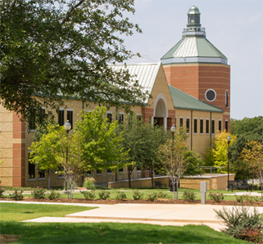B.S. Criminal Justice
Southwestern Adventist University’s Criminal Justice program prepares students for careers in a variety of areas, including:
- Law Enforcement
- Corrections
- Probation
- Forensics Analysis
- Private Security
- Paralegal Work
Our goal is to foster the knowledge and skills you need to be successful in these fields. We also want to give you the flexibility and depth needed for success in other positions.
Opportunities in the public sector -- such as law enforcement at the municipal, state, national or international level – involve uniquely meaningful and engaging ways to serve the common good, strengthen society, and provide compassionate support for people in need.
Public sector law enforcement and public safety positions also generally offer:
- Job stability
- Good pay
- Health benefits
- Retirement benefits
General Education Requirements
Most local, state, and federal law enforcement agencies require a college degree. A criminal justice degree helps to develop skills that agencies are looking for, including:
- Communication skills: A key skill police officers and detectives must have is the ability to listen and process information well when gathering facts about a crime and to express details about a given incident in writing.
- Empathy: Police officers need to understand the perspectives of a wide variety of people in their jurisdiction and have a willingness to help the public.
- Good judgment: Police and detectives must be able to determine the best way to solve a wide array of problems quickly.
- Leadership skills: Police officers must be comfortable with being a highly visible member of their community, as the public looks to them for assistance in emergency situations.
- Perceptiveness: Officers, detectives, and fish and game wardens must be able to anticipate a person’s reactions and understand why people act a certain way.
Careers
While criminal justice graduates often enter the workforce as police officers, the prospects for expanded opportunities are vast. A criminal justice degree can prepare you for careers in asset management, crime scene investigation, corporate security, corrections administration, federal protective services, and corporate loss prevention.
This is a good first step for certain career paths that require additional schooling. A criminal justice degree can also serve as a pre-law degree and the foundation of a criminal law career.
Professions
- Forensic Science Technician
- Police Officer
- Detective
- Lawyer
- Forensic Accountant
- Forensic Psychologist
- Homeland Security
- Criminal Investigator
- Government Agent
14%
Expected employment growth of forensic science technicians between 2018-2028
7e35.jpg?itok=oHYe6b38)
When Ryan Wilmot, criminal justice graduate pictured to the far left, was asked about what he found most beneficial about the Criminal Justice program, he surprisingly responded that he considered his writing classes to be some of the most useful to his career. “People don’t understand how much paperwork is involved in police work. I spend a majority of my time writing. When writing my reports, I have to be able to develop a good narrative from the evidence we collect. I have to convey the information well enough so people can visualize the crime scene even though they were not there to see it.
“I enjoyed my time at Southwestern Adventist University and I’m glad that the students have the opportunity to study criminal justice while getting a Christian college experience.”



| Required Cognates | ||
| Item # | Title | Credits |
| PSYC 212 | General Psychology | 3 |
| SOCI 111 | Introduction to Sociology | 3 |
| Sub-Total Credits | 6 | |
| Total Credits: | 54 | |




